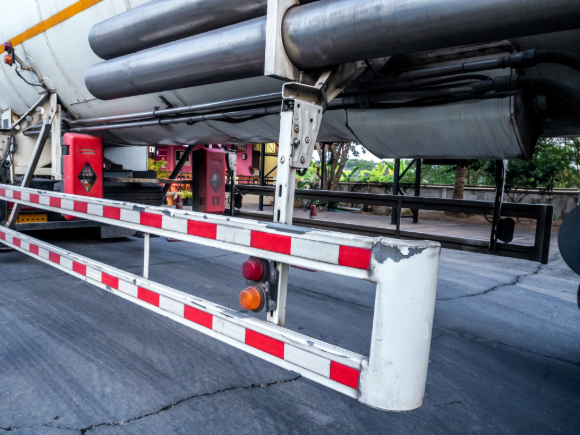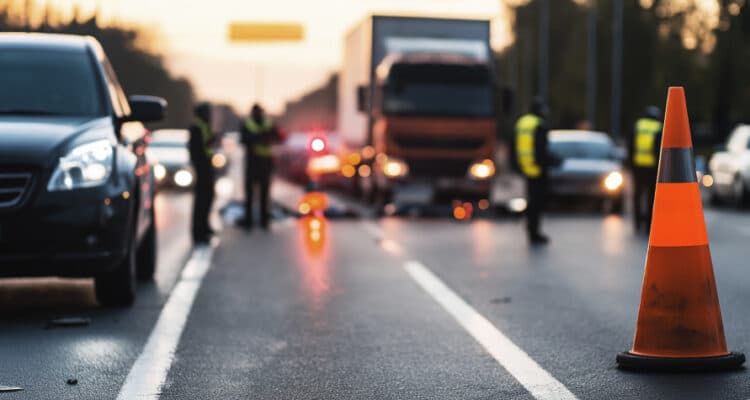When a car strikes the side of a trailer at highway speed, the consequences can be devastating. The hood crumples, the windshield shatters, and the entire vehicle slides beneath the trailer. In a matter of seconds, the passenger compartment is sheared away. These are known as side underride accidents, and they are among the most devastating—and preventable—collisions on the road. Our Colorado truck accident attorneys prepared this article to talk about trucking side guards because they could save lives.
What Are Truck Side Guards?
“Side guards” are physical barriers mounted along the lower sides of trailers, usually between the rear axles and the landing gear. Side guards are designed to prevent smaller vehicles, cyclists, or pedestrians from sliding underneath a trailer in a side-impact collision.
The guards can be rigid (solid steel or aluminum barriers) or energy-absorbing, designed to deform on impact and dissipate force. Both styles protect passenger vehicles from catastrophic underride, keeping the vehicle outside the trailer’s deadly undercarriage zone.
Side guards are not new technology. The European Union, Japan, Brazil, and the United Kingdom already mandate them. In London, for example, side guards have been standard since the 1980s—largely to protect cyclists and pedestrians. The European Commission estimates trucking side guards have reduced side underride fatalities by up to 60%.
In contrast, since 1998, the United States has only required rear underride guards since 1998. Despite strong data and growing public pressure, side protection remains optional. It is one of those uniquely American policy paradoxes: we have the technology, we have the proof, and yet we are still debating whether safety is worth the investment.
What Makes Underride Injuries so Dangerous?
Underride injuries are particularly dangerous due to several critical factors:
- Severe head and neck trauma: When a passenger vehicle slides underneath a semi-truck, the point of impact is often at the level of the vehicle’s windshield or roof. This can result in catastrophic head and neck injuries for occupants, as there is minimal protection.
- Lack of structural protection: Most passenger vehicles are designed to absorb impact forces through front or rear bumpers. In an underride truck accidents, the impact occurs above the crumple zones, bypassing the vehicle’s primary structural protections and leading to direct impact on the passenger vehicle compartment.
- Higher fatality rates: The nature of underride truck accidents often results in a higher likelihood of fatalities. The severe intrusion into the passenger compartment can cause immediate and fatal injuries to occupants.
- Difficulty in extrication: After an underride truck accident, the damage to the vehicle can make it extremely difficult for emergency responders to extricate the occupants. This can delay medical treatment and exacerbate injuries.
- Occupant decapitation: In the most severe cases, underride truck accidents can lead to decapitation or other fatal injuries to the upper body due to the intrusion of the truck’s structure into the passenger compartment.
- Insufficient safety features: Standard safety features like airbags and seatbelts are not designed to handle the unique dynamics of an underride collision, rendering them less effective in these accidents.
These factors make underride injuries particularly dangerous and highlight the importance of preventative measures like side guards on trucks. Side guards help to mitigate the risk by preventing vehicles from sliding underneath the truck, thereby reducing the severity and likelihood of such catastrophic injuries.
Mandating Truck Side Guards
The National Highway Traffic Safety Administration is considering a proposal that would mandate side underride guards on large trailers. The proposal is in the Advance Notice of Proposed Rulemaking (“ANPRM”) stage. It would require:
- Rigid or energy-absorbing barriers mounted between the trailer’s axles and landing gear;
- Certification standards similar to rear underride guards (already mandated);
- Retrofit requirements for newer fleets within a certain model year range.
The NHTSA first began studying truck side guards decades ago, but progress has been painfully slow. The agency’s most recent ANPRM, published in 2023, asked for new data, cost estimates, and industry feedback. Since then, the rulemaking process has been stuck in the “analyzing comments” phase—a bureaucratic holding pattern that has now been pushed to January 2026 for further review.
The NHTSA report estimated that equipping all large trucks in the United States would cost more than $1 billion. The NHTSA also estimated that these measures would only prevent 17 fatalities and 69 injuries per year. However, that estimate excludes many types of crashes that are likely relevant. For example, it excludes truck accidents that involve more than just a single passenger vehicle and a single tractor-trailer and those that occur at speeds greater than 40 mph. The NHTSA also used speed limits and police-estimated pre-crash speeds rather than actual velocity changes gathered from event data recorders for its calculation.
Safety groups argue side guards could save hundreds of lives per year and significantly reduce fatality rates in truck accidents. The trucking industry, however, has raised concerns:
- Weight and fuel efficiency: Side guards can add several hundred pounds per trailer, reducing payload capacity and increasing fuel burn;
- Cost: Outfitting a large fleet could cost thousands of dollars per trailer;
- Data: The industry says crash data doesn’t yet show a clear cost-benefit ratio for mandatory installation.
Notwithstanding the trucking industry concerns, the implementation of truck side guards is a critical measure to enhance safety for all road users, particularly those who are the most vulnerable to injuries.
From the perspective of a Colorado truck accident attorney, there is also a legal dimension to this debate that often gets overlooked. In wrongful death or catastrophic truck accident injury cases, the absence of a regulatory standard complicates accountability. If truck side guards are not required, defense lawyers can argue a trucking company “followed all applicable laws.” This is true even if the result was a preventable death. Jurors, who are often unaware side guards exist at all, struggle to assign blame in a vacuum of regulation.
But when a safety rule exists, the analysis becomes simple. If a carrier ignores a truck side guard requirement and someone dies, liability is clear. The existence of a mandate creates a standard of care—a line between negligence and compliance that juries can easily understand. Regulations, in that sense, do not just save lives. They also make justice more consistent and fair.
Until the NHTSA finishes analyzing the comments and testing data, the rule remains in limbo.
Bowman Law: Colorado Truck Accident Attorneys
From the perspective of a Colorado truck accident attorneys, side guards represent the next logical step in highway safety—just like seat belts, airbags, and rear underride bars once did. When those technologies were introduced, industries complained about cost, weight, and complexity. Today, no one questions their necessity. The same will be true of side guards.
The benefits of truck side guards go beyond accident prevention. Truck side guards create transparency, accountability, and standardization. They give juries clarity and victims justice. And most importantly, they save lives—lives that can never be replaced once lost to a preventable design flaw.
Unfortunately, there will not be any new rules enacted until at least 2026. This delay is not due to lack of evidence. There is a delay due to pressure. Major freight and trailer lobbies argue that mandating side guards would be too expensive, too heavy, and not justified by the available crash data.
Moving forward, it is likely the trucking industry will continue to in their efforts but the debate should center on human value. We should be talking about the cost of inaction. Every life lost in a side underride crash is one too many, and every year without a mandate is another missed opportunity to make our roads safer.
Our Colorado truck accident attorneys have seen the aftermath of catastrophic truck accidents firsthand. One thing is for sure: no trucker, no company, and no regulator ever wants to face a family whose loved one died in a crash that could have been prevented by a $3,000 piece of metal.
The Colorado truck accident attorneys at Bowman Law have the experience and resources to go after truckers, shippers, and brokers for negligence. We have built a reputation in trucking cases by combining deep knowledge of FMCSA regulations, skilled accident reconstruction, and relentless advocacy for our clients. At Bowman Law, we do not just handle cases — we build them to withstand the most aggressive defense strategies.
If you were injured in Colorado truck accident, you deserve a law firm with a proven record of success. Please send us a message or call us at 720-526-0298 to schedule a free case evaluation. With Bowman Law on your side, you gain a team of Colorado truck accident lawyers who will fight to protect your rights, secure the compensation you need, and deliver the justice you deserve. We serve clients across Colorado’s Front Range and beyond, including Denver, Colorado Springs, Boulder, Fort Collins, Westminster, Lakewood, and Aurora.



 Return to All News & Resources
Return to All News & Resources


